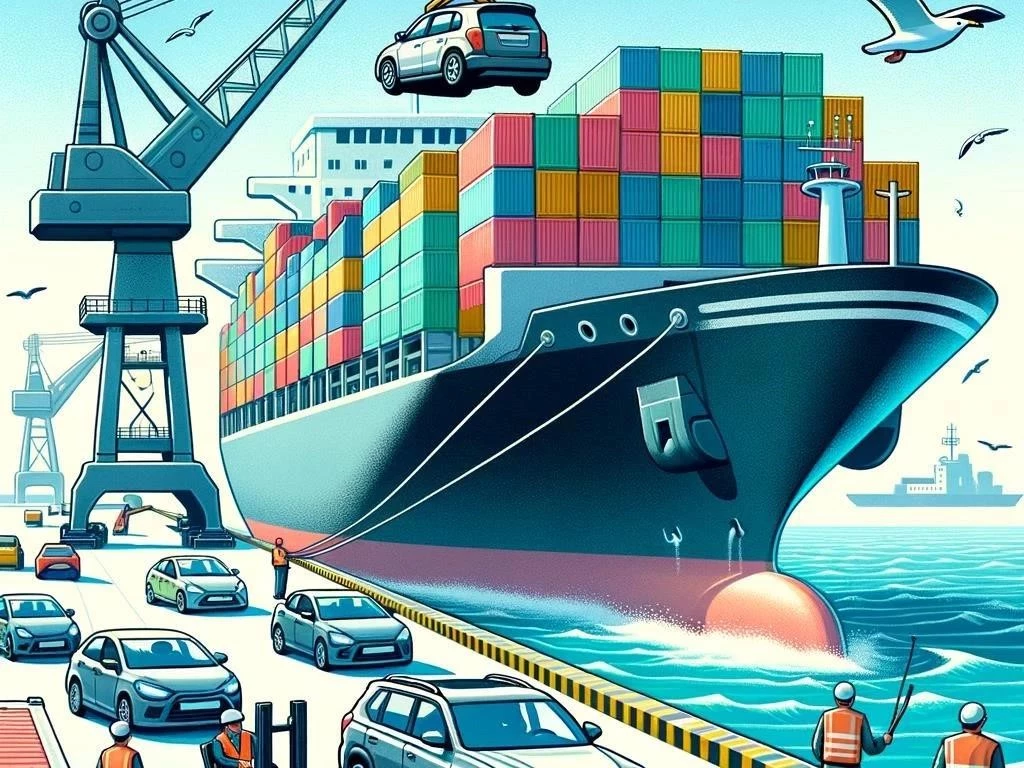Can You Ship Your Car to Another Country?
Shipping a vehicle internationally is feasible, but it requires understanding regulations, customs requirements, and logistics. Researching car shipping companies, costs, and insurance is essential for a successful overseas transport experience.
International car shipping involves transporting vehicles across borders, typically for relocation or purchasing purposes. This process is complex, requiring careful consideration of various factors, such as vehicle transport services, customs requirements, and local laws in the destination country. Understanding auto export regulations is crucial to ensure compliance and avoid delays. Additionally, obtaining shipping quotes from reliable car shipping companies provides insight into the potential costs involved in overseas auto shipping.
When planning an international relocation, it is essential to factor in transport logistics, including shipping methods like container shipping or maritime shipping. Each method has its benefits and drawbacks, impacting both shipping costs and delivery times. Moreover, import duties may apply when your vehicle arrives at the destination country, so it’s important to be aware of these potential expenses.
By taking the time to research and prepare, individuals can navigate the intricacies of international car shipping effectively, ensuring a smoother experience when sending their vehicles abroad.
Understanding Vehicle Transport Services
Vehicle transport services are specialized companies that facilitate the shipping of cars internationally. These services handle the logistics of transporting vehicles from one location to another, ensuring they arrive safely at their destination. When considering international car shipping, it is vital to choose a reputable service provider with experience in overseas auto shipping. They can guide you through the entire process, including compliance with auto export regulations and customs requirements.
These transport services typically offer various shipping options, such as open or enclosed trailers, depending on your needs and budget. Open trailers are more cost-effective, while enclosed options provide additional protection against the elements. Many vehicle transport services also offer additional features like delivery tracking, ensuring you are informed about your vehicle’s status during transit.
Furthermore, understanding the insurance for shipping your vehicle is crucial, as it protects against potential damages during transportation. Engaging an established vehicle transport service can significantly reduce stress, making your international relocation seamless and efficient.
Different Methods of Overseas Auto Shipping
When considering overseas auto shipping, several methods are available, each with its pros and cons. One popular option is container shipping, which involves placing the vehicle in a secure container for transport. This method protects your car from external elements and potential damage during transit. Container shipping is ideal for those who prioritize security and are willing to invest in additional costs.
Another common method is roll-on/roll-off (RoRo) shipping, where vehicles are driven onto a specialized ship. This method is generally more affordable than container shipping and is suitable for standard cars without additional protection needs. However, RoRo shipping exposes vehicles to the elements, making it less ideal for high-value or vintage cars.
Air freight options are also available for those seeking expedited shipping, although this method is significantly more expensive. Regardless of the chosen method, it’s crucial to understand the specific requirements and regulations associated with each option, ensuring a smooth and successful shipping experience.
Auto Export Regulations and Customs Requirements
Shipping a car internationally requires adherence to specific auto export regulations and customs requirements. Each destination country has its own set of laws governing vehicle importation, which may include documentation, safety standards, and emissions specifications. Before shipping, it is essential to research the destination country’s laws to ensure compliance and avoid potential legal issues.
Typically, necessary documents include the vehicle’s title, bill of sale, and proof of identity. Some countries may also require an inspection certificate or an emissions compliance form. It is advisable to check with the relevant customs authority in the destination country to understand all requirements fully.
Additionally, customs duties may apply upon arrival, and it is crucial to budget for these import duties to avoid unexpected expenses. Engaging a knowledgeable freight forwarding company can assist in navigating these complexities, ensuring all necessary paperwork is correctly filed and submitted. By understanding auto export regulations and customs requirements, you can facilitate a smoother shipping process for your vehicle.
Getting Shipping Quotes from Car Shipping Companies
Obtaining shipping quotes from car shipping companies is a crucial step in the international car shipping process. Start by researching various shipping companies that specialize in overseas auto shipping to ensure they have the necessary experience and reputation. Most companies provide online quote tools that allow you to enter details such as vehicle type, shipping method, and destination country.
When requesting quotes, be sure to provide accurate information about your vehicle, including its make, model, and condition. This helps companies give you more precise shipping quotes and identify any additional costs related to transport logistics, such as port handling fees or insurance for shipping. Comparing multiple quotes is essential to find the best balance between pricing and services offered.
Additionally, asking about hidden fees and understanding what is included in the quote can help you avoid unexpected expenses. Once you have gathered several quotes, you can make an informed decision on which car shipping company best meets your needs, ensuring a smoother shipping experience.

The Role of Freight Forwarding in Car Shipping
Freight forwarding plays a vital role in the international car shipping process, acting as an intermediary between the vehicle owner and shipping companies. A freight forwarder specializes in managing the logistics of transporting goods across borders, ensuring compliance with auto export regulations and customs requirements. They simplify the entire shipping process, handling documentation, customs clearance, and transport logistics.
By engaging a freight forwarder, you gain access to their expertise and established relationships with various car shipping companies, facilitating better shipping quotes and options. They can recommend the most suitable shipping methods, whether container shipping or roll-on/roll-off, based on your vehicle and budget. Additionally, freight forwarders can provide insights into insurance for shipping, ensuring your vehicle is adequately protected during transit.
Moreover, they assist in tracking your shipment, keeping you informed about its status throughout the journey. Overall, utilizing the services of a freight forwarder can significantly reduce stress and streamline the complexities involved in shipping your car to another country.
Container Shipping vs. Maritime Shipping
When shipping a car internationally, understanding the differences between container shipping and maritime shipping is essential for making an informed decision. Container shipping involves placing your vehicle in a secure container, offering enhanced protection from weather and potential damage during transit. This method is particularly suitable for high-value, vintage, or luxury cars, as it minimizes exposure to risks.
On the other hand, maritime shipping, particularly roll-on/roll-off (RoRo) options, involves driving the vehicle directly onto a specialized vessel. While this method is often more cost-effective and faster, it does leave the vehicle exposed to the elements during transit. Therefore, RoRo shipping may not be the best choice for vehicles requiring additional care.
Both methods have distinct advantages, and the choice depends on your specific needs, budget, and the value of your vehicle. It’s essential to weigh the shipping costs, potential import duties, and insurance for shipping when deciding. Ultimately, selecting the right method can ensure a smoother and safer shipping experience for your car.
Factors Influencing Shipping Costs and Import Duties
Several factors influence shipping costs and import duties when transporting a car internationally. One primary factor is the method of shipping selected, such as container shipping or roll-on/roll-off (RoRo). Container shipping typically incurs higher costs due to added security and protection for the vehicle. In contrast, RoRo may provide a cheaper option but offers less protection.
The distance between the origin and destination significantly affects shipping costs, as longer distances generally result in higher fees. Additionally, the size and weight of the vehicle can impact pricing, with larger or heavier cars incurring increased shipping expenses. It’s also essential to account for port handling fees and other logistical costs associated with transporting the vehicle.
Import duties vary by destination country and can be influenced by the vehicle’s value, type, and age. Researching destination country laws regarding import duties is crucial, as unexpected charges can arise. Understanding these factors helps you accurately estimate shipping costs and prepare for any potential import duties, ensuring a smoother shipping experience.
Ensuring Compliance with Destination Country Laws
Ensuring compliance with destination country laws is crucial when shipping a car internationally. Each country has specific regulations regarding vehicle imports, which can include emissions standards, safety requirements, and vehicle registration processes. Before shipping, it is imperative to thoroughly research the destination country’s laws to understand what is required for a smooth importation process.
Documentation is often a vital component of compliance. Required documents may include the vehicle’s title, proof of purchase, and various certificates confirming adherence to local regulations. Some countries may also mandate an inspection or an emissions test prior to shipping. Engaging a knowledgeable freight forwarder can greatly assist in navigating these complexities, ensuring all necessary paperwork is accurately prepared and submitted.
Additionally, understanding potential restrictions on specific vehicle types, such as modifications or age limits, is essential. Failing to comply with these laws can result in delays, additional fees, or even the rejection of your vehicle at customs. By proactively addressing these requirements, you can facilitate a seamless shipping experience for your car.
Tracking Your Delivery and Insurance for Shipping
Tracking your delivery and obtaining insurance for shipping are essential components of the international car shipping process. Many reputable car shipping companies provide tracking services that allow you to monitor your vehicle’s status throughout its journey. This feature offers peace of mind, as you can stay updated on the location and estimated arrival time of your car.
Additionally, securing insurance for shipping is crucial to protect your investment during transit. Various insurance options are available, depending on the shipping method chosen. Container shipping often includes comprehensive coverage, while roll-on/roll-off (RoRo) shipping may require you to purchase additional insurance separately. Understanding the terms of the insurance policy, including coverage limits and deductibles, helps ensure adequate protection against potential damages or losses.
Moreover, it is advisable to document your vehicle’s condition before shipping, taking photos to verify its state upon arrival. By combining effective tracking solutions with appropriate shipping insurance, you can significantly reduce stress and safeguard your vehicle throughout the international shipping process.








